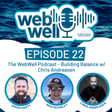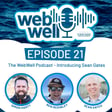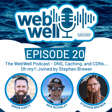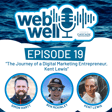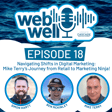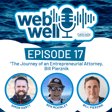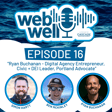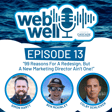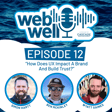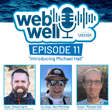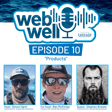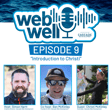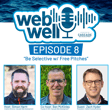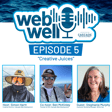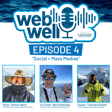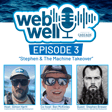Become a Creator today!Start creating today - Share your story with the world!
Start for free
00:00:00
00:00:01

The WebWell Podcast, Episode 2 - "VC Banking or Cash Under Your Mattress."
We certainly don't claim to have any sort of financial advisor status... but that's exactly why we wanted to talk about the recent run on Silicon Valley Bank. In this episode we also talk about what venture capital is and how a business like Cascade Web Development operates around it.
Transcript
Introduction to the Web Well Podcast
00:00:06
Speaker
Welcome to the Web Well Podcast, brought to you by Cascade Web Development. I'm one of your hosts, Simon, along with Ben. And we can't wait to dive into all things internet, tech, web development, and web design.
00:00:20
Speaker
We'll also be discussing how we balance work and life and exploring the fascinating world of internet innovation. So whether you're a tech enthusiast or just looking for some entertainment, join us on this exciting journey as we explore the ever-changing landscape of the web. Thanks for tuning in and let's get started.
Excitement for Episode Two
00:00:42
Speaker
Welcome, everyone, to the Web Well Podcast. This is episode two. I'm joined here with Ben. Super excited to have everyone join us as we're feeling like seasoned veterans on this show, right? Being the second time we've done this. But we're really excited, Ben. How are you feeling? Yeah. Feeling great on this end. Ready to jump in. Just as you swig some water. They can't.
00:01:11
Speaker
Yeah, they can't see that. We're all good. Yeah, I know. Excited to jump in though. We're, like I said, we're old pros at this, so thanks for bringing us all together here once again, Simon. Yeah. No, I figured, okay, so the first part of our sessions, or at least the beginning part of our podcast ends up going
00:01:31
Speaker
somewhat smoothly and really just try to talk about what we have done the last couple of weeks since it's been two weeks.
Podcast Schedule and Subscriber Encouragement
00:01:39
Speaker
And for all the listeners out there, my goal is that I can keep this to a two week interval. So two episodes a month. If we can pick it up even more than that, we will, but otherwise we're going to aim at that and target
00:01:53
Speaker
first and last week or first and second week in in the month. So just keep an eye on that. Don't forget to subscribe and follow. But yeah, so this is the part where we kind of check in to see what we've been doing.
Snowboarding Injury Story
00:02:04
Speaker
I'll jump in first, mainly because I'm trying to wake up a couple of weeks ago. I sprained my rib, which apparently is worse than breaking it. So real stupid snowboard accident where I just wasn't paying attention, caught an edge like
00:02:19
Speaker
I don't know, 20 yards from the lift and just fell. It was real stupid. But in that split second saw stars and like looked around. No one saw me except for my wife and son who were laughing because I don't fall ever. But basically went down the hill wheezing and just pain and went to where no one could see me and laid down for a little bit and just suffered. But I've been I'm recovering. Went to the chiropractor. He
00:02:47
Speaker
made it hurt really more that night. But basically, yeah, I'm just working through this pain and hopefully get better.
00:02:57
Speaker
Well, I know a thing or two about falling on snow. I guess my only advice to you is the softer the snow, the easier the blow. But I've done my fair share of falling on the hard stuff and at one point cracked four ribs and punctured a lung. I didn't get x-rayed for like four days and fortunately navigated that all right. But yeah, it doesn't hurt less as we get a little bit older and more fragile.
00:03:22
Speaker
Well, it's funny you mentioned that because, uh, for all the listeners that don't know, so every Monday morning at 10, we have a team altogether kind of meeting on zoom. And, uh, I had mentioned that as a review of my weekend and in both you, I remember you saying that and Stefan were just like, go to the doctor right now. Like we know people that have like died from it. And I was like, Oh man, got me all worried. So I had to call and get my appointment scheduled pretty quick. Cause I was all concerned and.
00:03:49
Speaker
started feeling like new pains, even though they're just in my head probably. Yeah. So got checked out, Simon. Yeah, me too. Just to have him tell me there's nothing I can do. Tell me over the last couple of weeks, what have you been up to, Ben?
Ski Coaching Season and Backcountry Adventure
00:04:10
Speaker
Well, I think the highlight for me is it is wrapped up season 27 of ski coaching. Um, and then a couple of days later, uh, to accelerate that transition headed back to the Wallowa mountains, um, entered, um, out of union Oregon and, uh, spent five days and four nights back country skiing with.
00:04:28
Speaker
Some of my closest ski buddies dating back to the mid 80s, two close friends, Tyler and David, that I grew up ski racing with, as well as a number of other good friends that I've met along the way, including a good friend, Tyler's, that flew up from the Bay Area with him.
00:04:45
Speaker
Um, so yeah, we spent one night in a yurt and the comforts of, uh, of that environment. And then we threw on the heavy packs and crawled over the mountains into the deeper, uh, little zone in the range and set up a camp there with, uh, with one large teepee tent that we used to kind of hang out in had a titanium wood stove to keep us all warm. And then at night we'd retreat into what are called mega mids, which are super lightweight, uh, single wall.
00:05:13
Speaker
Tents, little micro teepees that there were two of us in each of those and slept in that environment for three days and skied for four days out there and lots of lines. The guides had never skied before and yeah, it was phenomenal. I've been doing that since 2010 with the same guides and so seeing that relationship evolve has been incredible.
00:05:37
Speaker
I'm sharing out the variety of friends who's got kind of bit of a core but then you know couple rotate in and out for whatever reason each year. And this year was interesting and that we got a bunch of snow the front end of the week and so we had to kind of use into the terrain carefully cuz there was some snow stability issues variety of natural slides both.
00:05:58
Speaker
Wet loose wet dry she's been dry loose that were were revealed on the mountain so we couldn't get into some of the upper alpine terrain that we wanted to as well as some sun crest so we had to kind of sniff out the power and they did an amazing job and we got lots of really good skiing and just time walk in the mountains each day.
00:06:17
Speaker
When you say those little two man, single walled or whatever tents, are you digging into the snow for those? Are you, are you building little platforms and you do the low sections? So cold air goes down into that. Is that what you're doing? Like not a cave, but just on the snow. Yeah.
00:06:34
Speaker
Yeah, I know. It's a good question. Because they do come down at an angle on the ground, you end up digging down lower so that when you wake up in the night, you're not like face up against condensed moisture on that single wall. So yeah, we're probably digging down about two feet. We've got a little bench on either side, kind of a central countertop, if you will, that forms the base that the pole sticks up from, the single pole. In this case, we just chopped down some dead old trees.
00:07:03
Speaker
But a lot of times you just use a ski pole, extend it out, and then you pull it tight on either end. But the trick is that the part you dig down is sort of inside the outer area of the mega-mid material so that you can then kind of cover up around it. So when the wind picks up, it's not blowing in the tent so much, but kind of up and over.
00:07:26
Speaker
Oh, so it's not the most comfortable environment by any stretch, even with a zero degree sleeping bag, an air mattress and a foam mattress. But man, get into that terrain and not seeing another soul for, you know, four or five days is pretty special.
00:07:40
Speaker
Yeah, and snuggling up with another dude in one of those tents, just trying to stay warm. All of this, you're carrying, right? Like each of you are just carrying a bag, your pack, like, and that's it, right? Yeah. Yeah. But the good news is, is that we just have to carry it from the starting point, which in this case was their base camp with the yurt and carrying it up at over about 2000 feet of vertical feet.
00:08:07
Speaker
And that's not optimal, but it's about four miles and 2,000 feet. And then we unload all of that weight, the sleeping bag, the food, the fuel. And then from there on, we're traveling with much lighter packs throughout the day for those three days. That, in contrast to when we traversed the range back in 2021, and in that case, each day starts by breaking down camp.
00:08:34
Speaker
loading it all in your backpack, usually 30 to 35 pounds, um, move into the next spot that later that day. And then as the sun sets and it gets really cold, really fast, uh, you're rapidly digging out, digging out your, your, uh, tent spot and then, uh, huddling around a fire and trying to stay warm before retreating for the night. So that was a little bit more of a rugged experience, but yeah, it's all pretty magical being out there on the Wallowa mountain range.
00:08:59
Speaker
Yeah, it's funny. I've done a few trips, a lot of camping over the years and in a couple of different countries and stuff. And one of the things I always notice is it's different than like a RV or tent camping where you're like with supplies and all that. Cause you'll stay up maybe until 10, maybe 11, like around the campfire, telling stories, drinking beer or whatever.
00:09:17
Speaker
Uh, but when you're out there and he starts to just like drop temps drop, uh, your little fire, you maybe are limited on wood, maybe supplies, and it's not that big. So it's just like, it's the thought that it's warm. Uh, do you find yourself like looking at your clock, you're watching when you're in bed, you're like, it's six 30. Like, screw it. I'm in bed, you know, right? Yeah.
00:09:42
Speaker
Yeah. A hundred percent. A hundred percent. I was pretty ill equipped in 2021. I'm getting better at this whole winter camping thing. But, um, yeah, now we've got better equipment, but learned a lot of tricks and going to bed early is definitely one of the best ones that and heating up a, um, uh, water and putting that in analogy and sleeping with the hot water.
00:10:00
Speaker
along with also like hand warmers, your typical hand warmers, throwing those in your pocket. All those are really great tricks that sometimes are learned the hard way after a couple of really, really cold nights out.
00:10:13
Speaker
Yeah, not that this is totally comparable, but I used to like up at Schweitzer where you used to ski as well. Schweitzer over there. Um, I used to sleep in the back of my truck, uh, up there. So we'd ski one day, sleep in the bed of the truck, which just, you know, had a canopy, right? It's not out air open, but yep.
00:10:32
Speaker
It's cold. Uh, first, first night I realized my mistake was that I left my, my pants outside of my sleeping bags. When I got up, they were like a brand new pair of car hearts. You know, when they're like just stiff, right? I couldn't even move my breasts. So I was like, all right, night two, they went in and at the foot. I just put them in my sleep bag. They were so much easier to put on and warmer. Uh, yeah. Lesson learned for sure. Nice. Well, let's, uh, and when you're out there.
00:11:03
Speaker
I was going to say just closing comment on that is when you're out there moving through the mountains, you have to sleep with your boot liners in your sleeping bag as well. Otherwise, same situation you wake up and it's just it's just a nice block. And so in this case, we did have the guide tent with which had the stove. So we just hung them high in there and let them dry all night. But
00:11:21
Speaker
When you're out there changing camp each day, you end up sleeping with that in your tent. It's not for everybody, but it's pretty magical out there if you can endure some of that. Imagine the smell and that sleeping bag and tents afterwards is ripe.
00:11:39
Speaker
Nice. Yeah, I'm told. Let's kick off with today's topic, which admittedly is semi foreign to me, everyone that's joining in.
Tech Banking and SVB Collapse Introduction
00:11:51
Speaker
I had to kind of go at it.
00:11:55
Speaker
I did a lot of research and talked about it with Ben behind the scenes, really just because I wanted to learn more. So this session, just our disclaimer, we are not financial experts. We are not your financial advisors. Simon definitely is not here, who you should go to. Ben is not.
00:12:21
Speaker
I think we both have some unique perspective and experience when it comes to today's topic. Most specifically in tech banking and what I call the VC mattress, right? So it's where you put your money under a mattress, which would probably be safer than what recently happened in the news with Silicon Valley Bank. So why don't we just start off
00:12:48
Speaker
What happened? What's kind of the big synopsis recently in the news for tech banking then?
00:12:55
Speaker
Yeah, so I like you. I'm not a banking expert. I've, we've all been lucky here at Cascade to have Christie running the show from a, you know, the controller seat over the last 17 years. But I have been able to benefit from some excellent information from some resources that I have, including the Portland Seed Fund, as well as EO, which is short for Entrepreneur Organization. So I received some
00:13:20
Speaker
some good material from both of those and I was going to share some high points. This is definitely targeted at a higher level, you know, kind of operator perspective to try and just sort of distill down in layman terms what exactly went down and you know what we can learn from this. So definitely want to
00:13:37
Speaker
Add that caveat and of course, we're always looking for feedback and ideas and who might even want to come on and help us go deeper on the subject. But fundamentally, what my understanding is this is essentially a crisis of confidence and caused by a wildfire spread by a few venture capitalists advising their portfolio companies to withdraw money. So plain and simple, it was a bank run.
00:14:03
Speaker
It's interesting because Silicon Valley Bank or SVB had bonds that had declined in value, but the underlying securities themselves remain sound. They had this huge amount of exposure due also to the number of tech company dollars that have been deposited since the pandemic.
00:14:23
Speaker
And essentially that resulted in a liquidity problem, not due to underlining assets or deposits, but due to the exposure to venture capital backed companies and rising interest rates causing bond prices to drop. So that's sort of in a very high level nutshell, kind of how things transpired. So from there, I think a key point to mention is that banks fail due to a lack of capital.
00:14:53
Speaker
And so as we look back in the last several weeks, the first bank that went down was Silvergate. It was highly crypto-focused, and obviously cryptocurrency is very volatile. The next one that we're all talking about here is Silicon Valley Bank, high concentration in startup technology. 40% of their assets were in investments, and too many of the long-term plays were from low interest rate investments.
00:15:21
Speaker
And as the rates changed so much as a result of increasing interest rates by the Fed, the bonds were kicking out lower rates. And then ultimately, their equity to debt ratio got below 5%. And that's kind of the threshold for the FDIC.
00:15:38
Speaker
Another interesting thing about Silicon Valley Bank is that 90% of the deposits were uninsured, which means there was more than $250,000 in each of those accounts. So these are a lot of high net worth organizations, and in some case individuals. And then Signature Bank was the most recent, I guess the one after Signature, or excuse me, Silicon Valley Bank. And what they found was the long-term assets were under duress,
00:16:08
Speaker
fast growth, lots of crypto, and then long term SBA lending program. So, so those are the some of the high level details. And Simon, I think you'd you'd identified there were some, you know, like, who is this impacting? Maybe you want to talk to us a little bit about some of the research you had done and and identify who some of those those organizations were that that we may or may not be familiar with.
00:16:29
Speaker
Yeah. So one of the things that I noticed Ben, and really I'm going to answer your question, but also when I Googled this, when I searched it, I saw the news reports just out of curiosity. So we're talking about over 90% of the bank assets, the cash that was in there was over what the FDIC ensures up to $250,000. Who are the people standing in line?
00:16:52
Speaker
When they were doing the run on bank, like we're talking about people that potentially have money over $250,000 and they're standing in line outside Monday morning. I want to know who those people are. Right. Like, are they actually like going in to pull out their millions in cash? Are they going out to get it transferred? Like.
00:17:10
Speaker
They're sitting there knocking on the door. Are they opening? When are they opening? You know, like what about my millions? I just want to be friends with those people. Maybe like, there you go. Yeah. I just want to follow behind them and see what falls out of their pockets. I'm sure I'd be in a great position if I did that. Yeah. So, uh, speaking, well, go ahead.
00:17:32
Speaker
And interestingly enough, technology is one of the biggest issues that led to this, is that technology allowed for communication to accelerate for these limited number of VC firms to get this message out to their funded portfolio companies and to have them move that swiftly to make this bank run
00:17:53
Speaker
go so quick. I think it was like four hours and the whole thing collapsed. And so interesting how technology helped create this problem, yet people then reverted to the old analog. I'm going to go stand in line around the corner at the bank and see if I can withdraw my bags of cash. Like, I mean, the irony in that is pretty wild.
00:18:14
Speaker
Yeah. So again, speaking of companies, so I did some search, uh, and just figure out which companies were impacted most by this.
Impacted Companies and Economic Comparisons
00:18:22
Speaker
And when we start talking about these numbers here, they're numbers that I just can't fathom fully. Um, so Roku, right? I have a Roku TV in the garage. I think we have one in our camper, like, um,
00:18:35
Speaker
So apparently the company had a total cash and cash equivalent of approximately 1.9 million as of March 10, this year, approximately 480 million was held in S V B, right? So 480 million, that's 26% of the company's cash or cash equivalent as of that date. So approximately, uh, let's see, 1.4 billion of the company's cash equivalent was distributed against, uh, across multiple financial institutions.
00:19:05
Speaker
Right so other organizations roadblocks roadblocks i know my son knows better than i do three billion in cash and securities balance as of february twenty eight of this year approximately five percent.
00:19:20
Speaker
Uh, is held in Silicon Valley bank, which was one point or excuse me, 150 million, uh, in there. So one of the statements that I keep seeing in here is basically that it's not going to affect day to day that $150 million gone right now.
00:19:37
Speaker
and having to be sorted out doesn't affect their day-to-day. So big business, right? Let's see, we'll go down here, Rocket Lab USA, another one that I somehow recognize, approximately 38 million, which is approximately 7.9% of the total cash and securities by that company as of December 31st, the end of last year. Scrolling down, QuantumScape,
00:20:06
Speaker
Let's see, SoFi tech, SoFi, that's a big company. I recognize that name. Um, yeah, they, they didn't even tell us how much was in there. Actually, no, the company has approximately $40 million lending facility that was provided through Silicon Valley bank, which is unaffected apparently, uh, by the FDIC receivership from that bank. So we're talking about big dollars, obviously, right?
00:20:35
Speaker
Yeah. What about those under 250,000? In terms of organizations? Yeah. I can imagine if I was the CFO and the CEO of an organization, that would be pretty frightening.
00:20:53
Speaker
Assuming that that that under $250,000 represented a significant amount of the of the cash for that organization. I mean, this happened, you know, mid month. So a lot of people are trying to make payroll. They're really trying to, you know, conduct business with these banks. And then this news comes in.
00:21:11
Speaker
and starts to really have a serious impact on things. So depending on whether or not they've distributed funds across multiple banks, they may or may not have been in a position to respond to that. And I can imagine that was a pretty excruciating 48 hours over that weekend before things started to clear up. And it seemed like things got moving pretty well with a lot of government assistance come Monday to help address this exposure and these challenges.
00:21:40
Speaker
Another thing I've heard for sure is, gosh, $250,000 given the amount of inflation we've seen and how long that threshold has remained flat, it's probably time for that number to change and to increase dramatically. Because gosh, it doesn't take very long as an organization that
00:21:56
Speaker
you're going to need to have more than $250,000 safeguarded in a bank and not have to worry about a disruption like this, you know, as you scale. And so, you know, it's a great question. And I think it all depends on how well diversified these organizations were.
00:22:12
Speaker
Um, if they were exposed to some of these impacts with, with these limited number of midsize banks that are, are, um, are being exposed to this. So what does this mean for other tech startups that, that maybe have money in other banks? What do you think they're doing or did Monday morning, Tuesday morning, um, with all this news?
00:22:34
Speaker
You know, it's a great question. I imagine they were making phone calls to their banks. They were, you know, probably making, certainly trying to get information as much as they could from their own CFOs and other advisors if they were, you know, dealing with other people's money in the way of angel funds or, or venture capital funds, probably trying to seek counsel from them. But
00:22:55
Speaker
You know my hunch is they were looking at a couple different avenues one of the is making sure they're not over leveraged in anyone bank or should say leverage but invested in anyone bank. The other tool is out there that i learned a little bit about is that there are some of these opportunities where you can purchase insurance to cover funds over that two hundred fifty thousand dollars so.
00:23:15
Speaker
Yeah, the FDIC is going to cover that first quarter million, but beyond that, a lot of banks have these vehicles that you can, you know, for a fairly reasonable amount of money, you can purchase insurance that greater protects your cash balances. And as with all things, you know, the more you have, the easier it is
00:23:34
Speaker
in many cases to get access to that stuff. And so, you know, we even got some relationships with financial providers that allow us protection up to a million dollars in an account, you know, so again, that's FDIC covers that that first 250 K and then through fee structures, whether they're, they're obvious or not, you know, there's additional coverage above and beyond that so you can feel more comfortable.
00:24:00
Speaker
But I think it does highlight that it's one more thing that organizations need to really be keenly aware of that perhaps they, you know, had this growing, you know, amount of confidence over the last, you know, decade and a half that oh, you know, that's not going to be a problem.
00:24:15
Speaker
And in many cases, I think it might help too if I were to jump through and kind of talk about the why behind this, sort of how did this happen and was this at all tied to what we saw with the Great Recession in the late aughts. And so that was some eye-opening experience I'd love to share here as well.
00:24:34
Speaker
Yeah, for sure. So yeah, so jumping in on that, I think this a lot of this we can date back to the PPP stimulus. So essentially what happened with PPP is it was the it was the equivalent of applying gas, you know, gas to the the economy. Right. So assets grew dramatically as as the federal government infused a bunch of cash into the system to organizations as well as to individuals. And so the problems weren't credit based, but they were long term asset related.
00:25:05
Speaker
which constrains institutions. So here we are bumping along in 2020. We have this big scare. A lot of things get shut down, delayed, stalled. The government's like, we're going to throw a lot of money in here to keep the economy running. And that was great. But, you know, then all of a sudden we see in the last year, a whole bunch of inflation. And that's one of these few tools the Fed has to address this inflation
00:25:32
Speaker
issue that surfaced as a result of all of that accelerated economic activity. And so inflation is intended to lower production, increase the cost of money of borrowing. And we've seen that, in fact, the feds raised rates again today a quarter point. And I just read an interesting article about that where they were saying basically it's this balance between
00:25:56
Speaker
managing against inflation, which still is creeping up, but also not trying to destabilize the banking industry further than it already is. But when you do increase those rates, that's the equivalent of slamming on the brakes for the economy. And so you've got these opposing forces that started with the PPP stimulus, and now you've got the impacts of inflation
00:26:18
Speaker
all of this accelerated again by technology. And we're seeing that some banks that had exposure that they couldn't manage against are failing. And it's interesting because these issues back in the Great Recession, they were issues with credit risk, right? And that there were investments that weren't protected. And in this case, it's not about credit risk.
00:26:45
Speaker
because a lot of these issues were the results of these government-backed bonds that have these interest rates that are now being impacted by inflation. So it's a matter of timing with interest rate chart changes. It's not an issue of credit risk. So it's just this new soup of problems and some new issues that banks are having to manage against and therefore their customers.
00:27:10
Speaker
So this really does affect access to money as well as what I'm hearing, right? Yeah. Yeah. Certainly is, is, um, is impacting that. Cause yeah, if, uh, you know, it seems like every, everything in many cases that the,
00:27:27
Speaker
The money's there. It's just that they've got a whole lot more in the way of liabilities. And so if everyone's coming in trying to get their money at once, especially in these cases where the assets represent 5% or less, then there's just less than the way of money for people to get to. And that's when the FDIC steps in and says, hey, we're going to have to
00:27:55
Speaker
to help you manage through this. But as an example, one of the banks that provided some of this information via EO, they hold their assets at 12.5%. So that's, you know, two and a half times what the FDIC requires before they step in. And so I think taking some more conservative approaches can be very helpful. But obviously, if you're holding on to that additional
00:28:17
Speaker
you know, one and a half times or seven and a half percent of, of investable money that's leaving money on the table as a bank. And, and that's, that can be a tough move to make if they're really trying to grow. Um, but obviously creating, you've taken a little bit more of a conservative approach can really look genius in moments like this. Yeah. So let's get back to one of the, the acronyms you just said, EO, uh, we need to explain what that is. But first, uh, I read a quote from CNN, uh, an article they wrote last week.
00:28:47
Speaker
Uh, and they said this, um, that, that basically they highlight the SBC S V B. I can't even say that right. S V B, uh, cyclone Valley bank had very heavy exposure to the tech industry, which has particularly been hit hard by the raising interest rates. So my question to you is why, why is it that tech was hit hard by interest rates? Like why specifically?
00:29:14
Speaker
Well, I think a lot of these tech companies, especially software as a service companies, they require a lot of money to operate. And back in 2008, when we hatched Brand Live and then we spun that out in 2012, 2013, we quickly learned that in order to grow, you lose money. It costs more money.
00:29:39
Speaker
to grow than, um, then, you know, the, the growth provides. And so you're kind of constantly trying to show enough growth to get access to more funding so you can show more growth so you can get access to more funding. Then you hope to kind of like shoot the moon and have someone decide to acquire you before, you know, the economy slows down like this and, and all of a sudden your ability to raise more funds is compromised. So
00:30:02
Speaker
In a nutshell that's my understanding of it is that a lot of these tech companies just require so much money to grow and when they can't as easily find investment as we're seeing with a lot of companies the investment communities is not as inclined.
00:30:19
Speaker
to lend money and the cost of money is higher, then all of a sudden they're looking around and getting a little bit more desperate. So we've seen that with a couple of our clients that are in the funded startup technology startup space in the last year really have to face some tough challenges because they were kind of going along and burning money like crazy because that's why the investors give it to you not to hold on to it, but to spend it and grow. And then all of a sudden some factors outside of their control shift, they're going back out to market trying to find money and they're looking at it going, man,
00:30:49
Speaker
People are less inclined to to lowness money and or the cost of money is so prohibitive that it it doesn't make sense to to take on some of that what you might call harder money that is is you know has. Ultimately just has the access to it is is much less friendly and then you know the ramifications of not paying back on time get a lot less friendly as well.
00:31:15
Speaker
Yeah. And you mentioned software as a service. So there is that as being an asset, right? The intellectual properties to patented, you know, technology pieces. Uh, but it's a little different obviously than like real estate, right? Cause you still have that hard asset of a building or property or land. So finding loan, finding money for it's easier because they can go and collect from you. But I think in tech, right? Is you have less of that. You have fewer of that. You don't have a fleet of vehicles. You don't have, um,
00:31:45
Speaker
a bunch of restaurant buildings that are taking up space in downtown Portland, Seattle, Spokane area, right? So that may also be part of that difference, why tech is a little different that way, yeah.
00:31:58
Speaker
Yeah, absolutely. It's it's less tangible. It's less real. You know, a lot of that is goodwill. It is intellectual property or IP. And, you know, that takes that takes confidence that takes trust. And it's not something like you said, where if, you know, it can go from from a massive valuation
00:32:17
Speaker
to literally zero because it's code, it's ether in many cases. And if people lose trust in that, it's gone versus something hard and tangible like real estate, like hard assets in the form of vehicles and the like. At least there's something that an investor could hope to recover of their original investment. Yeah, that makes sense. So as far as cascade,
00:32:43
Speaker
How does this affect us? Why, why not? What are the areas that you kind of look out for for us?
00:32:51
Speaker
Yeah, well, you know, a lot of credit goes to Christy, our controller, in that it doesn't immediately impact us. We're not working with these mid-sized banks that are showing this vulnerability. We work with, you know, some of the big four banks. And, you know, essentially, we work really hard to avoid these balances that are in excess of the insured amounts as well.
00:33:14
Speaker
That's something that we have kept an eye on, fortunately, but also, fortunately, we're not with these riskier institutions that have shown weakness in this time. Now, obviously, there could be a larger ripple effect that could impact some larger banks like we operate with, but
00:33:30
Speaker
But for now, we seem to have dodged that bullet. And there were a couple of those accounts where we needed to move some funds around. And this was a heck of a wake-up call, fortunately not resulting in a lot of lost sleep immediately, but making sure that, hey, we're playing by those rules and we're doing everything we can to protect our clients and our team and ultimately the organization.
Cascade's Financial Strategies
00:33:52
Speaker
So this is a little off our notes. I don't think I'll throw you under the bus with this question, but as I hear words that start with our recession coming up with stuff like that looking at this year, is this potentially just like the Turkey little indicator that it's done?
00:34:13
Speaker
This is actually a good thing. Um, I just know since, since the great depression, since the crash, uh, in, in what was it 2008? Right. Um, that this is maybe actually a healthy thing that maybe it is like you're saying, uh, a chance for everyone to reanalyze where their money is to, to kind of secure, uh, their positioning. Um, do you think that's the case with this?
00:34:41
Speaker
You know, I don't know, I don't know enough about this space. I think it's getting a little bit above my pay grade with that question. But I, you know, in that article that I was reading, I think it was the, the Washington Post, just before this call, they were talking about the concern with that interest rate hike that happened today by the Fed, you know, if that further slows down the economy, then we could be moving into that recessionary
00:35:07
Speaker
phase. And some people were being critical of the Fed saying, hey, everything was leveling out. We didn't need to do that. And with some of the situations in the banking industry right now, maybe that wasn't the right call. But I think, yeah, it's definitely one of those times where having some cash on hand, not requiring a lot of outside financing is probably the safest place to be right now.
00:35:34
Speaker
and certainly having confidence that your cash is in a safe place so that should the economy continue to slow, you're in a position to weather that storm. I think that's, we're definitely, we've been giving our, giving a lot of attention to, you know, those types of concerns over the last several years and certainly in the last several weeks.
00:35:53
Speaker
So I guess to round this out just with one of the final last questions. And again, we're not financial advisors. We're not pros at this. We're just giving kind of our opinion and our look at this after kind of doing some research and from our experience. What do you think you would suggest to any startup, any organization that's just working with a VC? What would you suggest for them to operate with a VC that way?
00:36:21
Speaker
Yeah, well, I'll tell you, maybe for a little context, again, Brand Live is a company that we hatched here in Cascade, and then we spun it out and raised money multiple times before exiting that organization.
00:36:37
Speaker
at the beginning of 2020. And what we learned through that is that oftentimes these venture capital funds, these investment funds and angel funds, they all have partnerships with these banks. And those banks work really hard to be appealing to the fund and all of the portfolio companies within them. And so
00:37:05
Speaker
we received a fair amount of pressure when we were going through that kind of program and system with these, these VC funds and, and, and, and capital funds. And, you know, at that time our controller again was Christie and she said, no, we're good. We're in a good spot. So while she was in control of that, she said, Hey, we're gonna, we're gonna go with what we know. We're going to stay with, you know, one of the big four banks and, and that's good enough for our needs right now.
00:37:30
Speaker
In terms of advice I would give to others is ultimately follow the money. Just get a sense of why a certain venture capital organization or fund is pushing a specific bank. What's in it for the fund? And then what's in it for you and what kind of exposure is acceptable to your business to work with that bank versus any other kind of bank.
00:37:57
Speaker
Um, so yeah, we, we did receive a lot of pressure and ultimately made the decision not to, I don't know, uh, I have no idea what brand live, um, what their banking situation is currently. So none of my business, but, um, I just know, uh, before when we were working with, you know, uh, more, you know, larger.
00:38:15
Speaker
banks with largely distributed portfolios and banking practices that served us well then and it continues to serve us well. I'm sure there's, you know, we missed some opportunities by not jumping in with that, you know, with Silicon Valley at the time or some of these other banks that are sponsors. But yeah, I think like anything in this day and age, chase the money down, get a sense of where motivations are and make sure that they align with what you're trying to accomplish ultimately as a customer.
00:38:44
Speaker
Well, yeah, that's kind of common sense or just basic good advice and a reminder probably for some of those out there.
00:38:52
Speaker
Well, I think it's a good spot to end it there. Again, this topic was different for me because it's very high level. It's the money stuff, right? So as we talk to our audience and for our audience, as we think about topics, I know that you and I were kind of like, what would this appeal to? Who would this appeal to? And quite frankly, I think you being business owner, me being employee, we talked about employee-employer. I feel like in tech world,
00:39:22
Speaker
those that, that kind of have their ears perked and are listening to, you know, financially, the, the environment around them. I feel like that topic should be relevant for everyone. Right. Yeah.
00:39:38
Speaker
Yeah. And it's really interesting to think about how, you know, what a business owner should share and present to members of his team. And I think, you know, fortunately we're in a position where we do our best to be as transparent as possible. And I'm very comfortable saying to our team that, you know, fortunately this is not one that bit us. And much like we like to share with our clients that when there's widespread, you know, like
00:40:06
Speaker
malware issues and viruses and bugs, we've been able to avoid a lot of those things and sometimes being a little bit smaller, maybe taking some more conservative approaches around security. And in this case, banking can really pay off versus kind of full throttle risk profile in all areas of the business.
00:40:26
Speaker
Obviously, that can create some exciting growth, but it can also create volatility. So yeah, I would certainly be curious to know what some of these institutions are sharing with their employees and where they just decided to kind of keep their head in the sand. And it's just another example over the 25 years I've been doing this where fortunately, we can report stability and safety to our team. And that's a really comfortable place to be.
00:40:51
Speaker
yeah and and from the employee perspective i think all of us that have always taken pride in what we do and taking ownership in what we do there's a certain amount of that transparency that we really appreciate right as an employee i kinda wanna know those things
00:41:06
Speaker
However, there's some things that I'm just straight up, no, I don't want to know. You manage that. I'm good. I'm trusting, right? But I think there is that balance of like you sharing that with me or leadership and other organizations sharing it with their team. And granted, obviously, it's a level-based kind of knowledge where
00:41:26
Speaker
management directors, C-suite may know more obviously, they need to potentially know more. But I think having that kind of transparency with that situation, I think just helps a lot of people give more buy-in and more trust that when leadership is telling them something, I think it's just easier to swallow.
00:41:46
Speaker
So, well, I appreciate it. I'll say that. I've always been part of that. So, yeah, I think that rounds out our topic today.
Listener Engagement and Next Episode Teaser
00:41:57
Speaker
Just as a reminder for everyone that is listening, we'd love to hear your comments, questions,
00:42:02
Speaker
Um, we did set up an email. I mentioned that last, uh, last podcast, uh, Stefan took care of that like the following day. So email questions, comments, anything you want us to, uh, to highlight or, or if you even want to be on the show with us, um, email us at web well at cascade web dev.com. So again, that's web well at cascade web dev.com.
00:42:25
Speaker
And don't forget to give us a follow and a like and all those things that people say at the end of podcasts. So definitely appreciate all you listeners. Ben, thanks again for sharing. Next podcast, just a quick little teaser. Stefan is going to be joining us and we're going to talk about machines. We're going to talk about machines that can respond, also known as AI. So stay tuned for that. I look forward to it.
00:42:55
Speaker
Awesome. Thank you, Simon. I look forward to talking to everyone soon.
